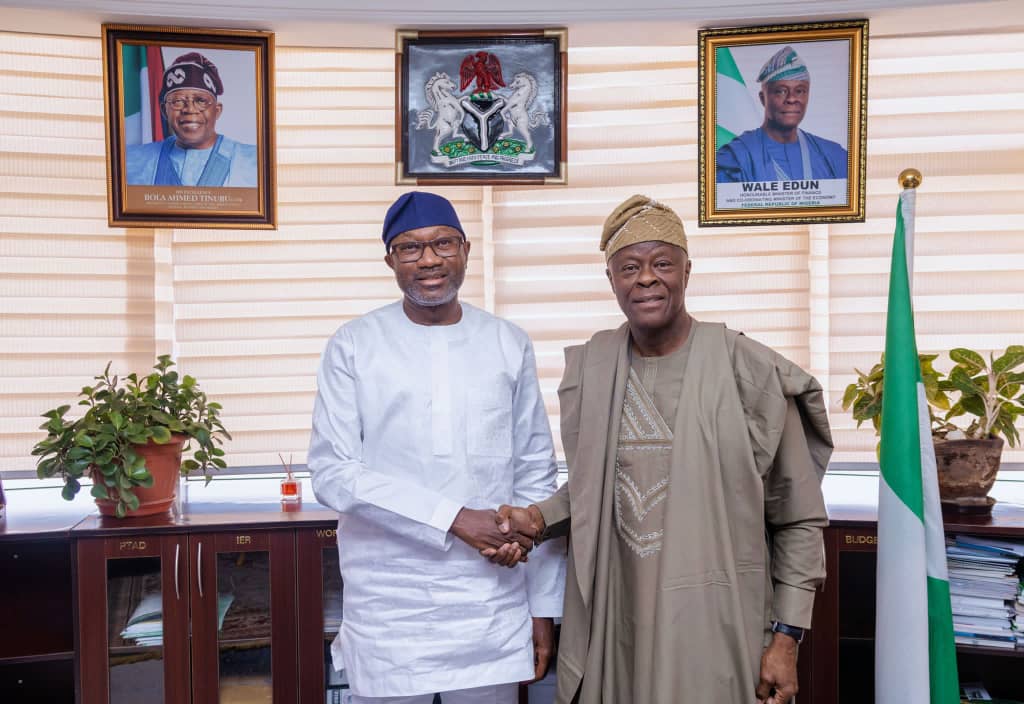By Oladosu Adebola Oluwaseun
The administration’s belief that a conducive atmosphere for innovation, transparency, and capital investment is paramount for national prosperity. This reaffirmation of commitment comes at a crucial juncture for Nigeria, as it navigates various economic reforms and seeks to attract both domestic and foreign investment to stimulate growth.The central event precipitating this announcement was a high-profile courtesy visit by Mr. Femi Otedola, a revered figure in Nigerian business and philanthropy, to the Honourable Minister of Finance and Coordinating Minister of the Economy, Mr. Wale Edun, in Abuja. The presence of the Honourable Minister of Budget and Economic Planning, Senator Abubakar Atiku Bagudu, at the meeting further emphasized the unified approach of the economic management team. This coordinated effort signals a cohesive strategy aimed at enhancing engagement with the private sector, recognizing its pivotal role in driving economic development. Such meetings are vital for fostering dialogue and understanding between policymakers and business leaders, ensuring that government policies are responsive to the needs and concerns of the private sector.
The discussions between the Ministers and Mr. Otedola reportedly delved into Nigeria’s evolving investment climate, with particular attention paid to the burgeoning opportunities within the banking and power sectors, including the rapidly expanding field of renewable energy. This focus is strategically sound, given the critical importance of these sectors to Nigeria’s economic diversification and sustainable development goals. The banking sector provides the financial backbone for all economic activities, while a robust and reliable power supply is fundamental for industrial growth, job creation, and improving the quality of life for citizens. The inclusion of renewable energy underscores a forward-looking approach, aligning with global trends towards sustainable practices and potentially unlocking significant investment and employment opportunities.
A significant takeaway from the meeting, as articulated in the press release, was Mr. Otedola’s commendation of President Bola Ahmed Tinubu’s “bold economic reform agenda.” This endorsement from a prominent business figure carries substantial weight, potentially influencing investor sentiment and encouraging others to consider Nigeria as a viable investment destination. Otedola’s expressed “renewed confidence in the direction of policy under the current administration” suggests a positive perception among key economic actors regarding the government’s efforts to address long-standing economic challenges. This narrative of restored confidence is crucial for attracting the capital necessary for large-scale projects and overall economic expansion.
Furthermore, Mr. Otedola elaborated on the factors contributing to this renewed optimism, citing “improving macroeconomic conditions, enhanced regulatory clarity, and pragmatic fiscal measures.” These elements are presented as foundational pillars not only for restoring investor confidence but also for creating a more equitable playing field for both established conglomerates and emerging enterprises. Improving macroeconomic conditions, which would typically include factors like stable inflation, a favorable exchange rate, and GDP growth, are essential for businesses to plan and expand. Enhanced regulatory clarity reduces uncertainty and streamlines processes, making it easier for businesses to operate and comply with legal requirements. Pragmatic fiscal measures, such as tax reforms or incentives, can directly impact profitability and encourage investment. The idea of “more level ground” suggests a commitment to fairness and competition, aiming to empower a broader range of businesses to thrive, not just the giants.
Perhaps one of the most encouraging aspects of the press release is the affirmation from Mr. Otedola regarding the readiness of major Nigerian investors, including himself, to increase their commitments in sectors deemed critical for inclusive growth and national competitiveness. This commitment from domestic capital is often a prerequisite for attracting significant foreign direct investment. When local investors demonstrate confidence by putting their own capital at risk, it sends a powerful signal to international markets about the viability and potential of the Nigerian economy. Investing in sectors critical to inclusive growth implies a focus on areas that can create jobs across various skill levels, foster local content development, and contribute to a more equitable distribution of wealth.
In essence, the meeting serves as a powerful symbol of the Federal Government’s unwavering determination to collaborate closely with the private sector. This partnership is envisioned as the primary engine for driving sustainable economic growth and ensuring equitable development across the entire nation. The narrative propagated is one of synergy, shared vision, and a collective endeavor to harness the full potential of Nigeria’s economy. By positioning itself as a facilitator and enabler, the government seeks to unleash the innovative spirit and capital of the private sector to address national challenges and unlock opportunities. The emphasis on “sustainable economic growth” points towards long-term planning that considers environmental and social impacts, while “equitable development” suggests a commitment to ensuring that the benefits of growth are widely distributed, reducing disparities and improving living standards for all Nigerians. Therefore, is not just an update on a meeting; it is a strategic communication piece designed to articulate the government’s economic philosophy and its commitment to a private sector-led recovery and expansion.
